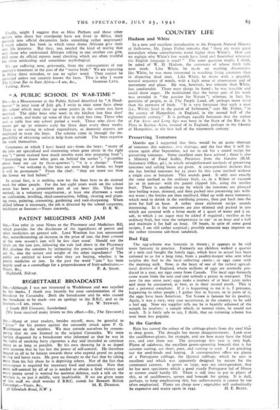A PUBLIC SCHOOL IN WAR-TIME"
Sm,—As a Housemaster at the Public School described by "A Head- master" in your issue of July 4th, I write to state some facts about this school which may clear up some points in the letters you have received. The older boys who work in the kitchen lose four days' work a term, and make up some of that in their free time. Those who wait at table lose one school period a week. Those who clean the rooms get up 30 minutes early for three days every three weeks. There is no saving in school expenditure, as domestic experts are employed to train the boys. The scheme came in through the im- possibility of obtaining suitable help from outside The boys organise the work themselves.
Comments of which I havz heard are—from the boys: "many of the jobs are specialised and interesting when gone about in the right way "; "never realised how much trouble went into preparing food "; "interesting to know what goes on behind the scenes "; "grumbles about food are cut by tin ee-quarters "; "it is a change." From parents: "we welcome it, the boys are more help at home, we hope it will be permanent." From the chef: "they are more use than the labour we had before."
In actual fact, it is nothing new for the boys here to do manual work for other people. For the last eight years work on the school estate has been a prominent part of tne boys life. They have worked, in a voluntary organisatior, at least one afternoon a week on cultivation, levelling, shed-construction, felling, clearing and plant- ing trees, painting, creosoting, gardening and tool-sharpening. When skilled labour is necessary, the job is directed by the school carpenter, bricklayer or forester.—Yours sincerely, D. R. W.


























 Previous page
Previous page